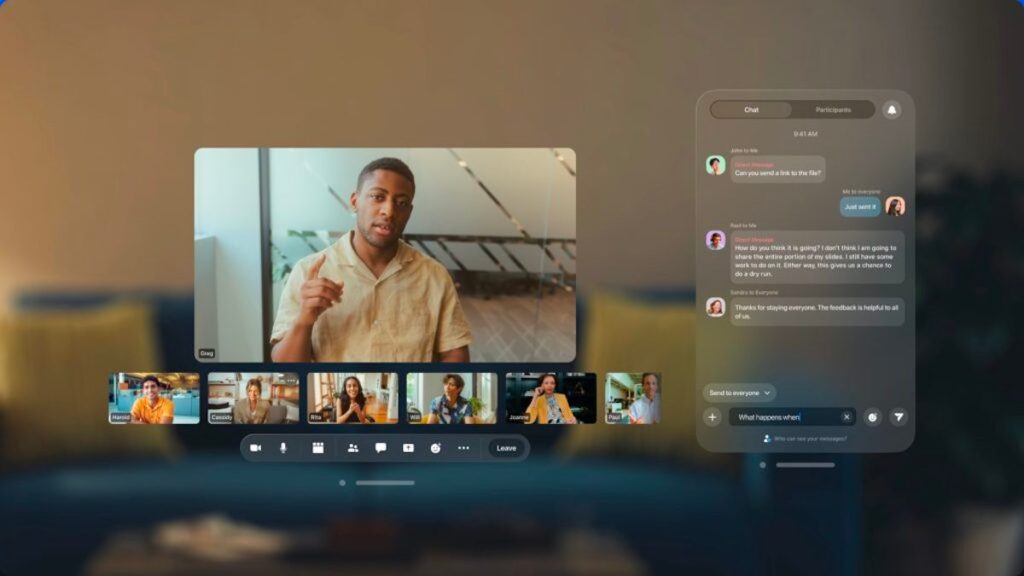 Photo Credits: ZoomDuring the launch of Apple Vision Pro, Zoom unveiled its forthcoming software for visionOS, set to be released on February 2. The new software introduces capabilities such as support for “personas,” enabling users to use a digital avatar during video calls, share 3D objects, utilize the “Team Chat” feature, and more. Apple’s Persona feature captures a user’s facial features, allowing them to present their own image in Vision Pro. The dedicated Zoom app also supports Persona, enabling participants to track their facial and hand movements. Additionally, Zoom on Vision Pro will utilize the headset’s AR technology, making video calls appear as a floating window that interacts with the user’s surroundings. “Zoom on Apple Vision Pro creates an immersive experience that can scale well, ideal for users who wish to feel as though they are in the same room with their colleagues and clients without the need for additional equipment or installation,” the company explained in a blog post. With the three-dimensional aspect of the visionOS software, users can share 3D files in Zoom and visualize them coming to life in their environment. The company cited game design as an example of how this feature can be utilized, stating that it enables developers to “collaborate and share the latest features” with players. Although 3D content sharing won’t be available at launch, Zoom has announced plans to introduce it later this spring. Also returning to the program this spring is Team Chat and a feature dubbed “the true pinch of the world.” Team Chat competes with Zoom’s Slack and allows users to easily share information with their colleagues. The video conferencing platform also launched its chat feature in March 2023. Finally, Vision Pro headset users can position up to five Zoom meeting participants wherever they are. They also have the option to remove the background of the participants, which the company hopes will enhance users’ sense of connection. Priced at $3,499, the Vision Pro will provide access to nearly 200 dedicated channels, including Disney+, Max, Discovery+, Amazon Prime Video, Paramount+, Peacock, Pluto TV, Tubi, Fubo, and Crunchyroll, among others. However, Netflix, Spotify, and YouTube are notably absent from the list, suggesting that some companies may not believe in the initial success of Vision Pro.
Photo Credits: ZoomDuring the launch of Apple Vision Pro, Zoom unveiled its forthcoming software for visionOS, set to be released on February 2. The new software introduces capabilities such as support for “personas,” enabling users to use a digital avatar during video calls, share 3D objects, utilize the “Team Chat” feature, and more. Apple’s Persona feature captures a user’s facial features, allowing them to present their own image in Vision Pro. The dedicated Zoom app also supports Persona, enabling participants to track their facial and hand movements. Additionally, Zoom on Vision Pro will utilize the headset’s AR technology, making video calls appear as a floating window that interacts with the user’s surroundings. “Zoom on Apple Vision Pro creates an immersive experience that can scale well, ideal for users who wish to feel as though they are in the same room with their colleagues and clients without the need for additional equipment or installation,” the company explained in a blog post. With the three-dimensional aspect of the visionOS software, users can share 3D files in Zoom and visualize them coming to life in their environment. The company cited game design as an example of how this feature can be utilized, stating that it enables developers to “collaborate and share the latest features” with players. Although 3D content sharing won’t be available at launch, Zoom has announced plans to introduce it later this spring. Also returning to the program this spring is Team Chat and a feature dubbed “the true pinch of the world.” Team Chat competes with Zoom’s Slack and allows users to easily share information with their colleagues. The video conferencing platform also launched its chat feature in March 2023. Finally, Vision Pro headset users can position up to five Zoom meeting participants wherever they are. They also have the option to remove the background of the participants, which the company hopes will enhance users’ sense of connection. Priced at $3,499, the Vision Pro will provide access to nearly 200 dedicated channels, including Disney+, Max, Discovery+, Amazon Prime Video, Paramount+, Peacock, Pluto TV, Tubi, Fubo, and Crunchyroll, among others. However, Netflix, Spotify, and YouTube are notably absent from the list, suggesting that some companies may not believe in the initial success of Vision Pro.













